Should your surgeon be skilled or polite? The answer determines AI’s impact on jobs
The Jobs Impact Quotient is a metric to asses. the impact of AI and Robotics on jobs. It is open-source, testable and falsifiable. You can customize it.
Asking, "Will ChatGPT take my job" is like asking if we'll have an economic recession next year. That question is too vague, broad, and general to give a meaningful answer. The Jobs Impact Quotient will introduce an objective and systematic way to think about this problem.
The Jobs Impact Quotient breaks down each job into six attributes. It analyzes the importance of each of the attributes on success in the job. It then asks how good AI is in those areas and how we can expect AI to improve in those areas. This allows us to calculate the Jobs Impact Quotient. A higher number indicates that AI and automation is more likely change the nature of this job, or completely disrupt it.
We can bucket jobs into three categories based on their Job Impact Quotient.
Can be disrupted anytime - these jobs will fundamentally change, and many of them will vanish.
Last mile interface for AI and automation - The primary responsibility of people who do these jobs will be to monitor, oversee, and referee AI and automation. They will provide a bridge between machines and society - sort of a human gearbox.
AI and automation as helper - These jobs will increase their reliance on AI and automation.
No impact expected
Here is how the nature of some jobs will change.
Let’s understand.
Don't focus just on ChatGPT; It has friends.
Focussing on ChatGPT and Dall-E is looking at the world through a narrow tube. We need to broaden our focus and think about the explosive combination of AI and robotics, which leads to automation in every sphere of our lives.
ChatGPT, Dall-E, and Midjourney belong to a class of AI known as Generative AI. They got a lot of press last year. We have collectively forgotten predictive AI, the previous type of machine learning algorithms. Predictive AI can generate music, read medical imaging to diagnose medical issues, and even help train salespeople to sell better.
Predictive and generative AI are complementary to each other.
Robotics
Robots currently serve us behind the scenes in warehouses, logistics, and shipping. With the rise of e-commerce, the demand for automated solutions in the supply chain has increased significantly. Warehouses and fulfillment centers are adopting robotics to improve efficiency and reduce costs. Autonomous vehicles and drones are being used for last-mile delivery, enabling faster and more flexible delivery options for consumers. In addition, robots are used for inventory management, sorting, and packing, which can be repetitive and physically demanding for human workers.
Robots are also making their way to the front of the curtain in other industries, such as restaurants and hospitality. In some countries, restaurants have adopted robotic servers and chefs to improve efficiency and reduce labor costs. These robots can take orders, prepare food, and interact with customers. Additionally, robots combat loneliness among seniors and people with disabilities. Companion robots can provide emotional support and social interaction, improving mental health and well-being. As technology continues to evolve, robots will become even more integrated into our daily lives, enhancing our experiences in both practical and emotional ways.
AI allows computers to play in the world of information and knowledge. At the same time, robotics enable computers to manipulate the real world. Robotics and AI combined allow the automation of many parts of our society, industry, and personal life.
Unbundling jobs into tasks
There is a lot of historical and emotional baggage with occupational descriptions like doctor, teacher, and soldier. A teacher is respected, a soldier is honored (or feared, depending on which side of the gun's barrel you are), and a doctor provides solace. When you look at the world through these lenses, it is hard to imagine that those jobs will be impacted by technology and automation.
If we unbundle jobs into the tasks done by them, we can find what is common in all the jobs, and think about how automation might impact them.
Each job is made up of a large number of constituent parts. James Cameron, creating Avatar, or a fry cook in Mcdonald's all rely on tools, best practices, and common wisdom to do their jobs. The level of creativity differs, but this commonality allows us to analyze jobs.
The roots of thinking about the constituent parts go back to the late 19th century when Frederick Winslow Taylor developed a theory called Scientific Management. Taylor believed that the efficiency of the work process could be optimized by breaking down tasks into smaller, simpler components.
The principles of scientific Management include the following:
Division of labor: Breaking down work into smaller, specialized tasks to increase efficiency
Time and motion studies: Analyzing each task to determine the most efficient way to perform it
Training and development: Providing workers with the necessary skills and knowledge to perform their assigned tasks efficiently
Incentive systems: Offering rewards and punishments to motivate workers to work at maximum efficiency
Management control: Managers should have centralized control over the work process to ensure it is carried out efficiently.
Before the advent of scientific Management, work in industries was generally characterized by a lack of standardization and a heavy reliance on the skills and experience of individual workers. Workers were expected to use their judgment and initiative to complete their work.
Scientific Management moved factory work from art to a craft. This began a long arc where each job would be scrutinized and broken down into smaller parts.
Tools and rules
Each job, profession, occupation, and trade uses specific tools. Every tool serves a unique purpose, from the simple pen and paper used by writers and journalists to the complex surgical instruments used by doctors and nurses. Tools can be physical, like a hammer or scalpel; digital, such as Microsoft Excel or a programming language; or knowledge-based frameworks, like Porter's five forces for analysis or negotiation skills in sales.
These tools are accompanied by accepted standards and best practices. For example, a chef has a set of standard knives used to carry out different tasks. There are specific ways in which these knives should be used to ensure safety and efficiency. Similarly, software developers use standard frameworks and libraries to write code, which helps to ensure the code is maintainable and scalable. Best practices for using tools often develop over time as professionals learn from their experiences and share knowledge with others in their field. In many cases, these best practices become standard practices that are widely adopted by the industry, further emphasizing the importance of using the right tools in the right way.
Skills and attributes
Looking at the tools and rules used by each profession allows us to think about what skills and attributes are fundamental to doing the tasks in a given job.
Focus on critical and essential attributes, not nice to have
Many cardiovascular surgeons are polite and empathetic. Neither their job performance nor annual compensation really depends on their bedside manners. On the other hand, a B2B enterprise salesperson's salary will be highly dependent on how well they communicate with the customer. A rude or standoffish salesperson is going to sell little. So while both professions employ soft skills like communication with empathy, those are crucial to success in being a salesperson. At the same time, they are less critical to be a world-class surgeon.
Six core skills and attributes
Empathy-based communication
Empathy is different from sympathy. Sympathy is feeling sorry or concerned about someone based on their pain or other personal situation. Empathy is recognizing and understanding another person's emotional state and responding appropriately.
Sympathy is about yourself, while empathy is about who you are talking to.
A childcare worker has to be able to communicate with children who often think and behave very differently from adults. Children tend to be more impulsive and emotional than adults, as they are still developing self-control and emotional regulation skills. This can lead to tantrums, outbursts, and other impulsive actions that may seem inappropriate to an adult. Children are not small adults.
The person in charge of a child's well-being has to use empathy to understand the child's concerns and communicate. Empathy-based communication is critical to the success of a childcare worker.
If your job is to make art hanging on hotel room walls, then you will not need much communication and very little empathy. You will need communication, and empathy, in selling your art to hotels, but not in creating the art.
Some jobs that require a high degree of empathy-based communication are
EMTs
Primary school teachers
Childcare worker
Some jobs that require very little empathy are
Commercial art painters
Garbage truck drivers
Judgment-based decision making
All jobs require some level of decision-making, but not all decision-making is the same.
A customer service representative has to make many decisions. Still, their actions are dictated by playbooks, guidelines, scripts, and standard operating procedures (SOP). Decision-making is primarily dictated by rules, not skills or judgment.
A surgeon repairing a diseased heart has to calculate trade-offs and risks and make decisions based on incomplete information and under time pressure. They make countless decisions based on years of education, training, and skills. Their job requires a lot of judgement-based decisions.
Some jobs that require independent decision-making based on years of education and experience are
Air traffic controllers
Cardiovascular surgeons
Jobs that don't require a high level of independent decision-making are
Adult education teachers
Baristas
Creating new knowledge
A cardiovascular surgeon's job requires high levels of independent decision-making and judgment, but they are not required to create new procedures. They do produce new techniques as a side-effect of their work. Still, if a cardiovascular surgeon did not publish a single paper in their career, their annual compensation won't be affected.
Creating new knowledge is optional for a cardiovascular surgeon.
On the other hand, a biochemist researches a broad range of areas, including genetics, metabolism, protein structure and function, cellular signaling, and drug development. They expand our understanding of how living organisms function at a molecular level. Their primary job is to create new knowledge.
Creating new knowledge is not limited to the scientific domain.
The envelope of human knowledge is expanded when someone produces a genre-defining movie, an architect pioneering a unique building style, or a music composer creating a new musical style.
A word of caution is in order here. The jobs listed above sound like they are always creative, but a lot of work done in those fields is derivative and formula based. Hollywood and Bollywood produce many sequels and franchises that fit a mold, and architects have names of types of buildings.
Some jobs where the primary objective is the further either scientific or creative knowledge are
Executive chefs creating new recipes
Developing a unique style of painting (like Impressionism or cubism)
Some jobs where success is not correlated with creating new knowledge or thought are
Voice over actors
Baristas
Optometrists
Line cooks
Assembling existing knowledge in innovative ways
Not all creative work results in new knowledge. Creativity is not always the same as new. Many creative exercises draw on existing knowledge.
Software developers are among the highest-paid professionals. But their work is increasingly like making a model of The Death Star using lego blocks. They spend a lot of time writing code to glue various open-source packages and libraries into popular frameworks.
They rely on an extensive repertoire of knowledge and spend a lot of time assembling it in new ways.
For example, GitHub introduced GitHub CoPilot in 2022, which can write up to 40% of your code. Their CEO, Thomas Dohmke expects Copilot could write up to 80 percent of code within the next five years.
Another job that requires combining a lot of existing knowledge in new ways is creating new recipes.
Chefs rely on a vast knowledge of cooking techniques, ingredients, flavors, and cultural cuisines. They often draw on their existing knowledge to create new and unique dishes by combining various ingredients and methods in novel ways.
McCormick & Company announced it collaborated with IBM to develop an AI application capable of generating flavors and food products.
Another example where someone used existing knowledge to diagnose a rare disease appeared in ProPublica.
It seemed absolutely crazy. The idea that an Iowa housewife, equipped with the cutting-edge medical tool known as Google Images, would make a medical discovery about a pro athlete who sees doctors and athletic trainers as part of her job?
— David Epstein, ProPublica
Some jobs where it is valuable and essential to assemble new ideas from an extensive repository of knowledge are
Paralegals
Marketing copywriters
Travel guides
Some jobs where this is not a requirement are
Optometrists
Air traffic controllers
Diverse motor skills
Many jobs require someone to be on-site and manipulate tools to get the job done. Physical presence and control of their environment using diverse motor skills is essential in these jobs. The word diverse should be thought of together with unpredictable and unplanned. Imagine a plumber only finding out the exact situation after they get in position under the kitchen sink.
Some jobs that require diverse motor skills are
Plumbers
EMTs
Childcare workers
Some jobs that don't require diverse motor skills are
Voice over actors
Tour guides
Air traffic controllers
Trust
Trust is different from empathy-based communication. We don't need the heart surgeon to empathize with us. We need to trust that they are a consummate professional who will do their best. There is an emotional element to trust.
Trust is for the heart, while communication is for the mind.
Examples of jobs where trust is critical are
Childcare workers
Teaching primary school children
Cardiovascular surgeon
Conversely, do you need to trust the tour guide when visiting Rome? You need to like them, and they need you to listen to them, which they can do if they empathize with you and tailor their delivery based on that. Empathy-based communication trumps trust here.
Similarly, society does not need to trust those driving garbage trucks. We need to trust the system that garbage will be picked up and the drivers they hire will drive those trucks safely.
The rating scale for each attribute
Now that we understand the importance of different skills and attributes, we will discuss how to rate the importance of each skill/attribute for various jobs. It helps to remember that all jobs are made up of many tasks.
Here is a rating scale that goes from 1 (not important) to 5 (critical to success on the job)
Not important. This skill is optional to success. On the internet, nobody knows you're a dog.
Somewhat important. You won't get fired if you don't have this skill, but it helps. A flight attendant that makes funny announcements reduces the drudgery of flying.
Important. It a nice to have. You will still do fine, but it will make the difference between the top 1% of those in this field. You can still be great at baseball without mastering Michael Jordan's Fadeaway.
Very important. It will be a handicap if you don't have this skill. You might still be successful if you don't have it, but it will take an extraordinary effort in other areas. Think of presidential candidates kissing babies.
Critical. If you can't hack this skill, do another job. Required for you to have the job, but it's table stakes. If you can't master an en garde, you can't even begin fencing.
An example might help. We'll use our stereotypical residential plumber for this example.
Empathy-based communication: Important.
Decision-making based on skills and judgment: Very important
Creating new ideas: Not important
Assembling existing knowledge in innovative ways: Somewhat important
Diverse motor skills: Critical
Trust: somewhat important
AI Capabilities and limitations
The final puzzle piece is understanding how AI and automation rank on the six skills and attributes, both now and in a decade. While predicting the future is hard, we will do our best to read the tea leaves.
We'll rate each skill on a capability rating of one to five, where each rating means the following.
Developing. Like a baby trying to walk. Fledgling
Competent. Get the job done but nothing to write home about. Like being able to prepare a weekday meal for the family.
Skilled. Can handle most essential tasks with care.
Expert. Usually achieved after years of training. A sushi chef.
Master. They set industry standards. Like Julia Child or A. R. Rahman.
So how do AI and automation rank on the critical skills and attributes?
Use existing knowledge Predictive and Generative AI (ChatGPT and Dall-E/Mid-journey) are experts in using existing knowledge. With the digitization of the world's existing knowledge, they will become Masters in 10 years.
Creating new knowledge We don't expect any kind to expand beyond Developing.
Communication with empathy AI capabilities in communicating with the heart is just Developing. Advances in Generative and Predictive AI will increase this to at least skilled in the next decade.
Trust Society's trust in Automation is Developing, but for many reasons, including the fact that a lot of automation will be cloaked in human likeness, hidden away from public sight, and general attitude changes, we expect society will start seeing automation as graduating to at least Skilled.
Diverse motor skills Robots can navigate and manipulate the physical world with capabilities best described as Developing. Advances in robotics and computer vision will rapidly increase an expert's qualifications within the decade.
Our framework is starting to take shape.
We are ready to assess the impact of automation on any job.
A combination of what skills are essential in a job and how well the current state of the art performs in terms of capabilities for those skills and the future will inform us and put things in perspective.
As always, a good example will inform our intuition. A soldier on a battlefield is protected by a combination of the skills in things that matter (being able to write poetry is not necessary on a battlefield while being able to run while carrying it) and the capabilities of your adversary in those same areas. Are you equipped and trained in all the right areas, and is your opponent, better or worse, qualified and trained?
Using this information, we can categorize the impact of jobs now and in a decade in the following words.
No impact.
Can be disrupted anytime This job, as we know it, likely won't exist or will be done by very few people. One example is artists who sell their art to tourists or whose works hang in hotel rooms.
Last mile interface for automation This job's primary responsibility will be to act as a helper for automatons. They will be the operators, maintainers, overseers, and referees. Warehouse workers, store checkout clerks, baristas, and paralegals' jobs will change here. Many primary care physicians, family practitioners, and some software developers are also impacted.
AI as a helper These jobs will increasingly rely on AI as a helper for productivity.
How can you use this information?
This essay presents a framework that you can use to analyze and estimate the impact of automation on your job or any other job. All you have to do is evaluate each core skill's importance to success. It is essential here to be as dispassionate as possible. This is not an exercise in judgment but analysis.
The final number you get is not gospel. It is only helpful to put things in context. The number can help you see if the job you are trying to analyze falls in one of the following buckets.
No impact
Can be disrupted anytime
Last mile bridge for automation
AI as a helper
All jobs will be impacted by automation, much like how electricity has changed all jobs fundamentally, forever, and foundationally. Automation, driven by AI and robotics, is like that.
Changing the fundamental building blocks
One of the building blocks of this model is our analysis of how capable automation is in each core skill. We also project our beliefs a decade in the future. This is fiendishly impossible to do. Feel free to change those numbers as well.
At De-Magic, we'd love to work with you to improve this framework. How can we make this better? Do you have suggestions for which skills are more or less necessary for different jobs? Did you use this framework for a job that is not listed here? If so, please tell us.


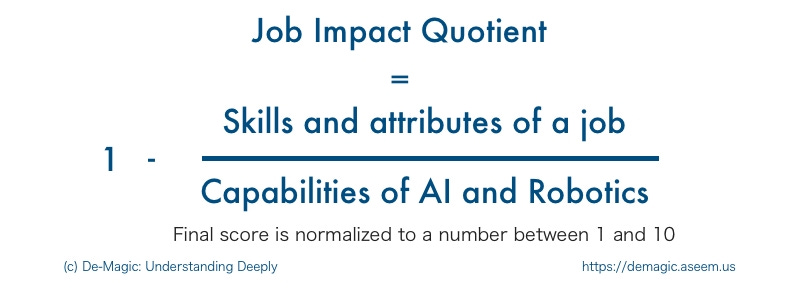
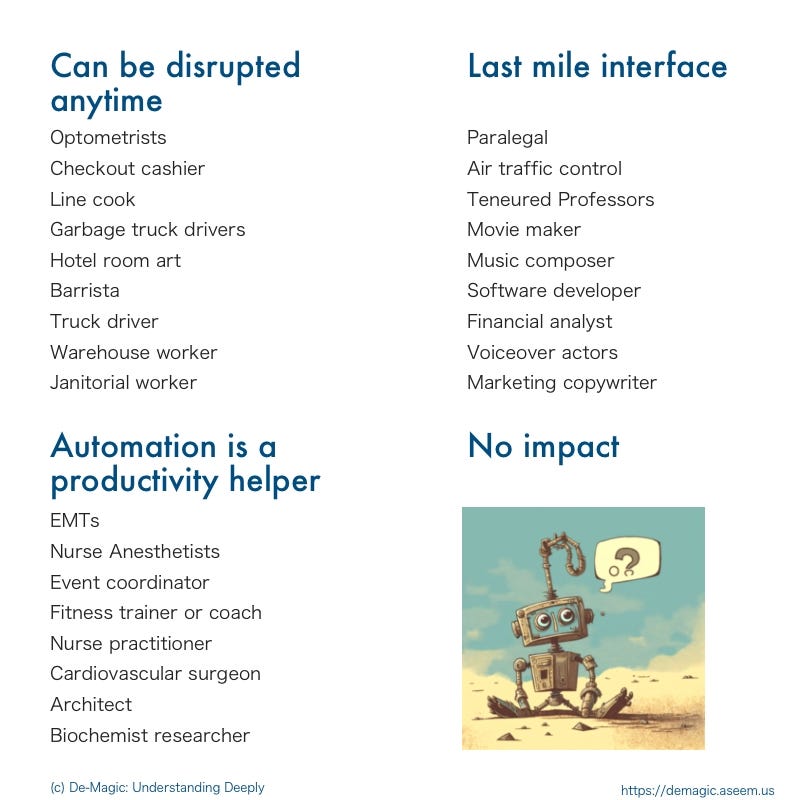
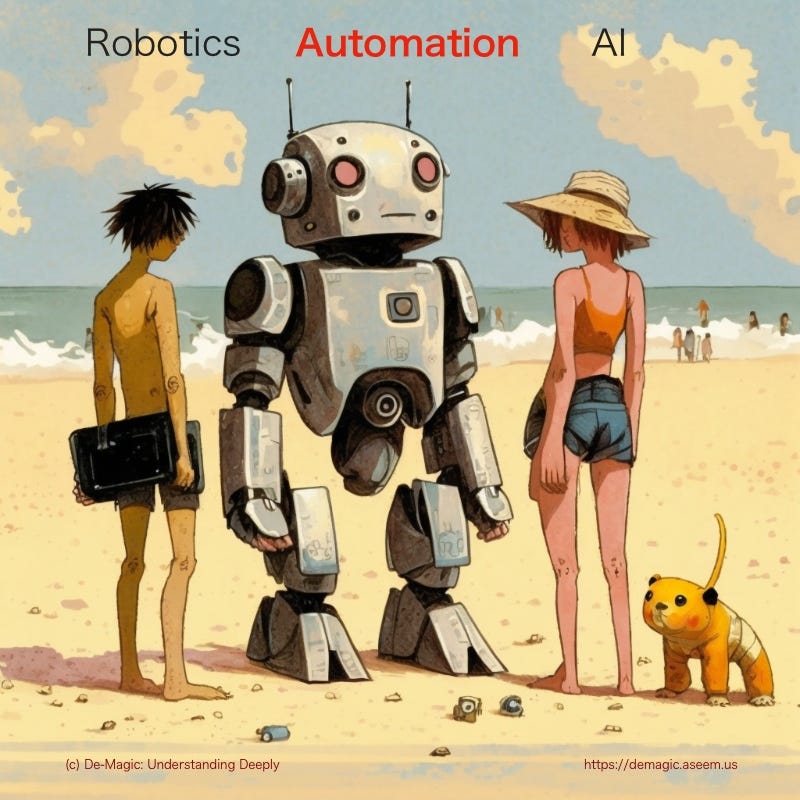
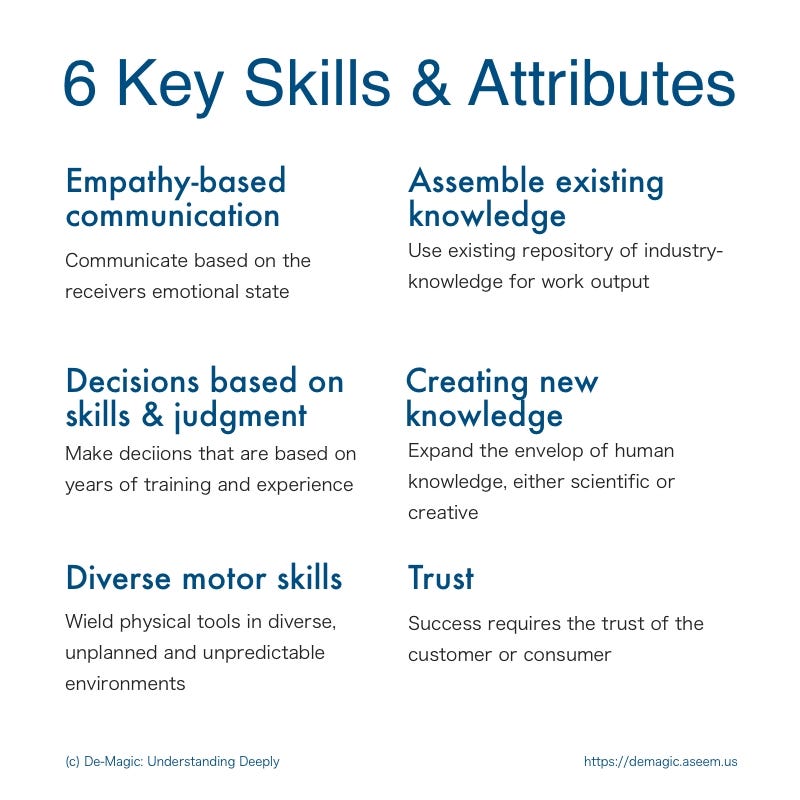
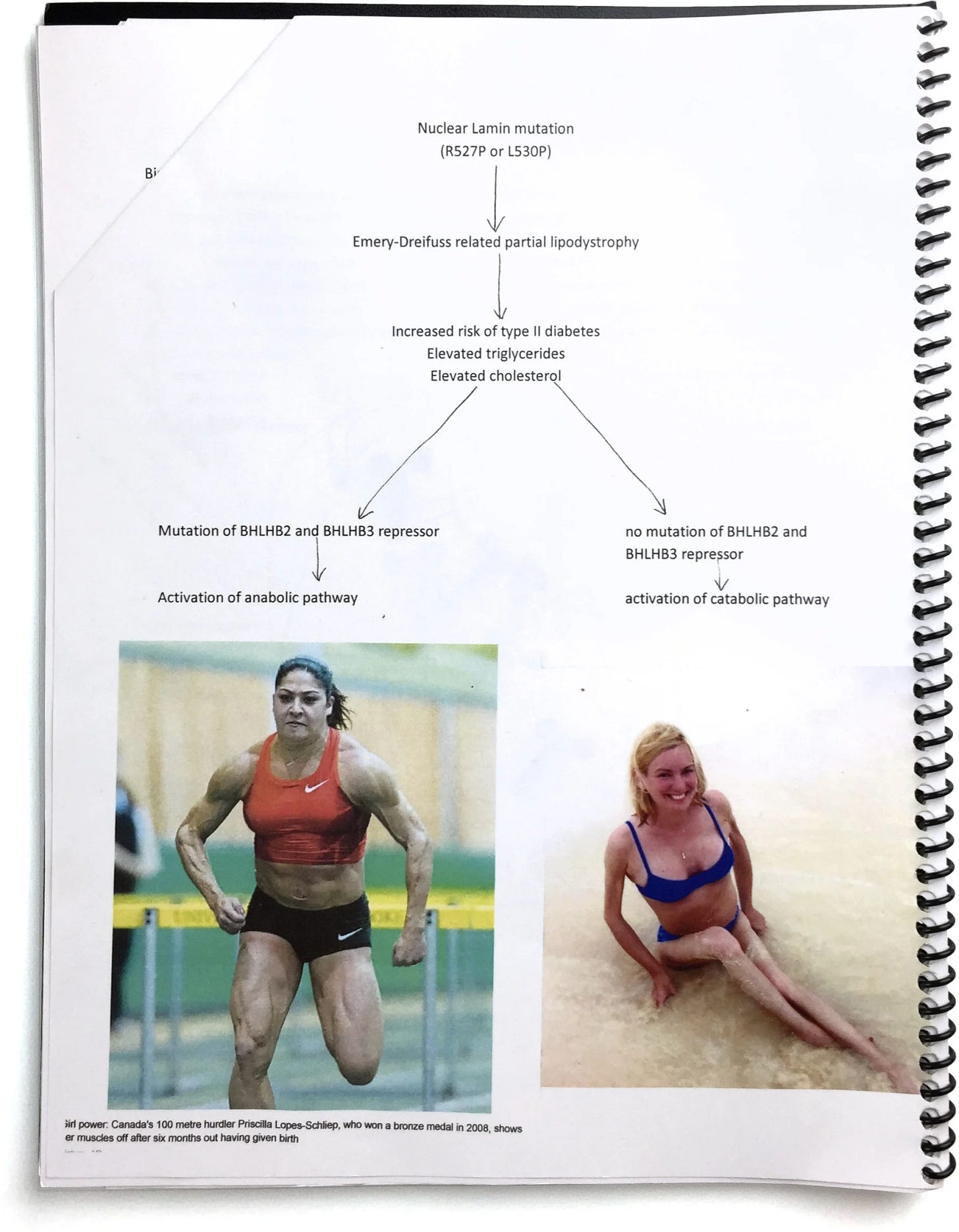
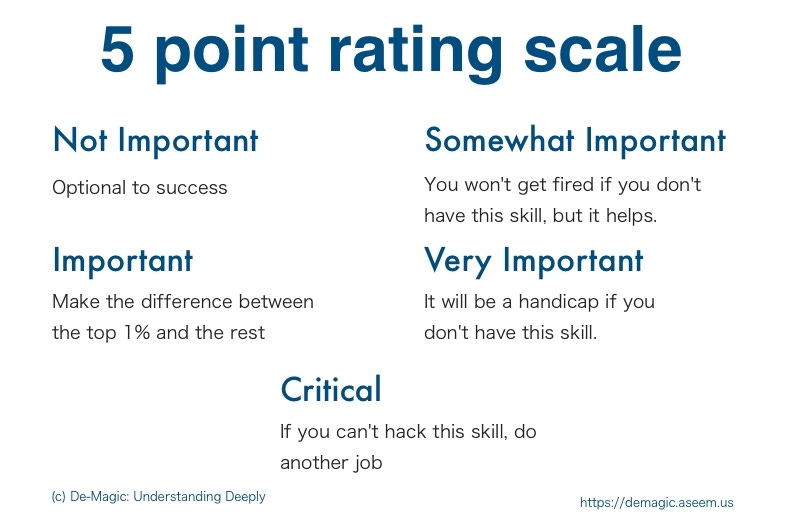

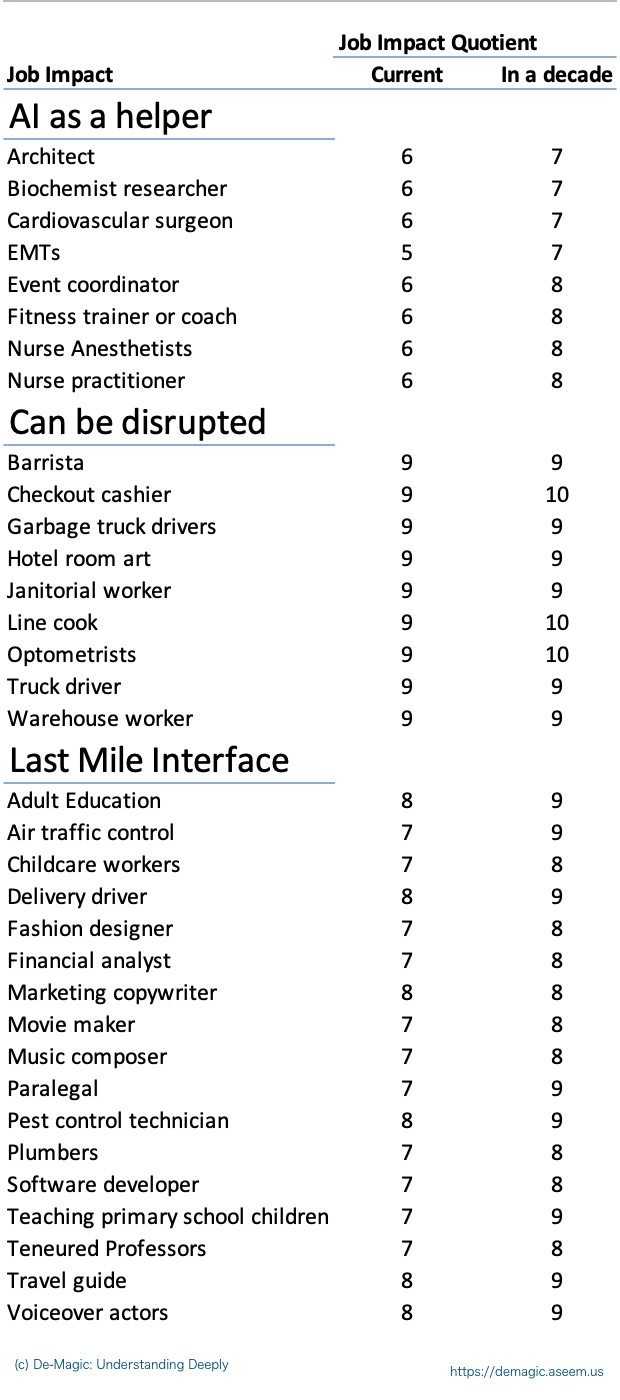
Very helpful and well-researched write up. As I transition from being a physician to a biotechnology researcher, spurred by the rise of AI, this post has given me renewed confidence in my decision and my future.
The emphasis on trust, a crucial element often overlooked in many think-pieces, is truly appreciated.
Brilliant Article Aseem! It was insightful ⭐
Love the point your made - 'Sympathy is about yourself, while empathy is about who you are talking to'
This could be a crucial benchmark statement for AI machines that wants to enter the sectors that needs 'human touch'